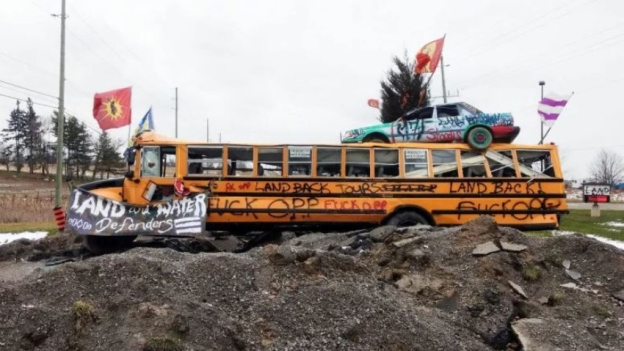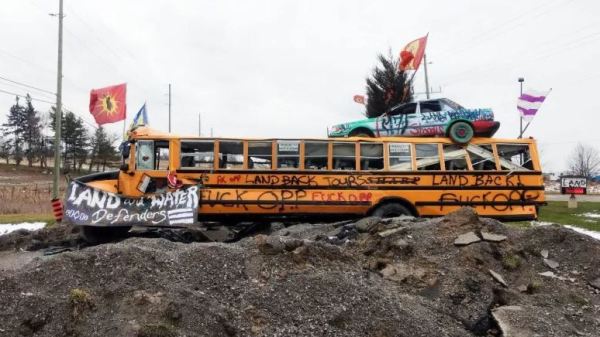
Six Nations members set up barricades in the town of Caledonia, Ont. in a dispute over land that has been going on for 200 years. (Naheed Mustafa/CBC)
‘The truth is we have a long way to go,’ says Anishnaabe writer who advocates for a re-education project
Six Nations of the Grand River in southwest Ontario is the largest most populous reserve in Canada. They have been stuck in a land dispute for 200 years — one that continues to this day.
At the heart of the current dispute is a housing development in the town of Caledonia called Mackenzie Meadows. The developer says it bought the land legally from Haldimand County. But members of Six Nations say it was never the county’s to sell in the first place.
In July of 2020, members of Six Nations took over the development’s construction site and renamed it 1492 Land Back Lane. Since then, people from Six Nations, along with supporters, have erected a series of tiny homes and tents on the housing site and are living there. For at least one man, it’s the first time he’s ever had a place of his own.
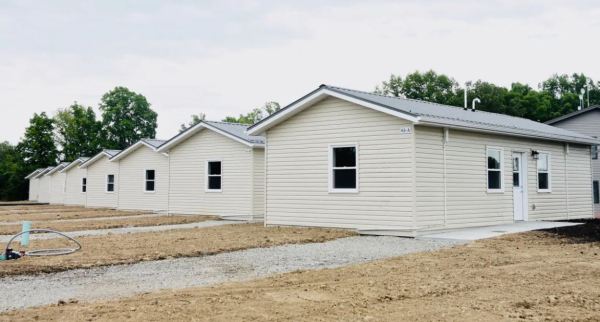
Eight new tiny homes have been built on Six Nations of the Grand River to provide affordable housing to its members. (Six Nations of the Grand River)
Courtney Skye is a research fellow at the Yellowhead Institute at Ryerson University and a member of Six Nations. She’s also part of the effort at 1492 Land Back Lane. Skye says the Mackenzie Meadows issue dates back to the late 1800s when a squatter settled on Haudenosaunee land. He stayed about five years, cleared some trees, and did some farming.
The man then sold the land, illegally, to a family for 500 £. That family farmed the land for the next several generations and, ultimately, sold it to a developer in 2003 for $4 million. The developer, Foxgate Development, now wants to put up more than 200 homes as part of a larger housing project.
The people of Six Nations reject that proposal.
The land is ‘part of who we are’
Skyler Williams is the spokesperson for 1492 Land Back Lane. He says the part that gets lost in all the technical details of the dispute and the legal back-and-forth is that for the Haudenosounee, this land is not just any land.
“That connection to the land for us is one that is part of who we are. Like this is part of our creation story. You know, that the Creator used this clay to build us,” Williams says.
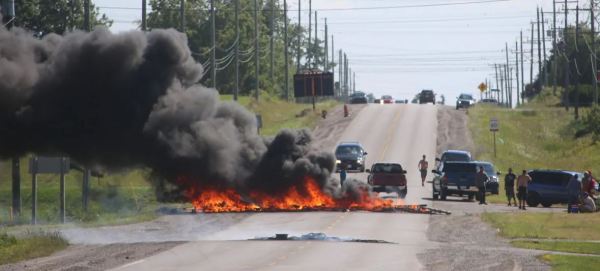
Some Six Nations residents set up a blockade on Argyle Street in Caledonia after OPP officers enforced an injunction on demonstrators, Aug 5, 2020. (Dan Taekema/CBC)
“That connection to us is one that’s real, is something that you can feel. And certainly when you come onto these lands this is that feeling of liberation, that connectedness to the land, knowing what our people are willing to sacrifice in order to maintain that connection is something that’s magnetic and it’s part of who we are.”
When it comes to land claim disputes, the focus of media coverage and legal wrangling is often on a specific piece of land at a particular time. But Skyler Williams says it’s about a much bigger question than just one housing development or one farmer.
He says land dispossession is about the larger systemic destruction — genocide — of Indigenous people. And that while there’s constant talk about reconciliation, there’s very little talk about land.
“Governments and police, the RCMP before the OPP, and the British before that, have committed these acts of genocide against our people for the last, 300 years, 400 years around here and continue to push that agenda to see us hemmed in at least, if not gone away. They completely like to see us left to overpopulate our area in a way that leaves us no choice but to cover those lands in concrete and pour asphalt in every spot of green that there is,” says Williams.
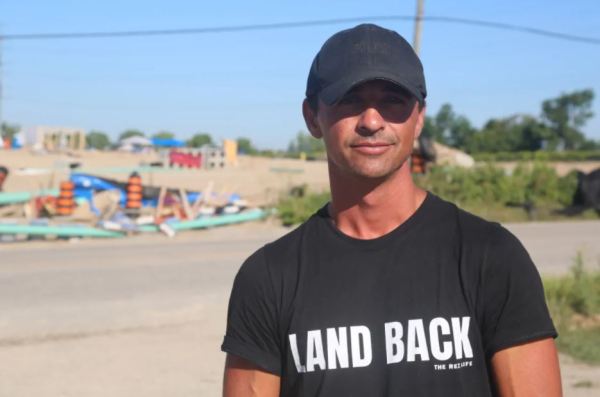
Skyler Williams is a member of Six Nations of the Grand River and a spokesperson for the 1492 Land Back Lane camp. (Dan Taekema/CBC)
“And so for us to be able to say, like, all we want is the time and space for our community, because that’s the thing is all of those governments and police agencies have done over the last, say, 150 years is trying to divide our community. We look for every crack possible to drive wedges and make sure that we were unable to come together.”
Williams says Haldimand (County) and colonies surrounding the Grand River have taken advantage of and created divisions that continue to harm people. He points to elected council, over-incarceration of Indigenous people, and the murdered, missing, Indigenous women and girls (MMIWG) as examples of the way harm continues.
“And so when it comes to the dispossession of lands like this for us it’s something that is part of who we are. You know, it’s easy to look the other way when racism is something that is systemic, you know, something that’s built into the system. But when racism comes in the form of, you know, 100 OPP [officers] coming to arrest 12 people in a field singing Kumbaya by the fire, like this is what racism looks like in this country.”
Reconciliation is impossible without land
The question of the connection between truth and reconciliation and genocide is an ongoing one in Canada.
Indigenous people will point out that while there may have been some attempts to move forward by delving into the sordid history of residential schools or holding an inquiry into MMIWG, the key question around land and Indigenous nationhood remains very much on the table — and that while reconciliation may seem like an active project in Canada, Indigenous peoples often say it’s devoid of justice.
Justice is tightly wrapped up in the question of land — and without land, reconciliation is impossible.
Ryan McMahon is an Anishnaabe comedian and writer. He says maybe the problem is that Indigenous people and Canada have different ways of understanding the truth.

Ryan McMahon is an Anishinaabe comedian, writer and activist. He also hosts a podcast about the deaths and disappearances of Indigenous youth in the northwest Ontario city. (Jane Adams/Canadian Press)
“When you look at the word truth, in my language you say debwewin and when you pull that word apart, the word debwewin actually means to speak only to the extent of the life you have lived or the experiences you have through good spirit. And so that’s the truth,” McMahon says.
“What is Canada even talking about in terms of the truth? We continue to discover new truths through this moment we’re in that we’re calling reconciliation. You know, a couple of years ago, we discovered an electric chair at a residential school. In the same year, we discover food experiments at other schools in the prairies.”
McMahon points to truths that continue to be discovered. From The Sixties Scoop; to MMIWG; to Indigenous people “experiencing catastrophic levels of systemic racism inside of the healthcare system. These are all truths.”
The writer says he’s hesitant to use the word debwewin because he says it makes a promise that “we’ve had the truth and now reconciliation, that we’re going somewhere good. That’s not true. I can’t say that in good faith.”
“And the fact that we throw a party when the federal government, the prime minister mentions decolonizing the government, we give out eagle feathers and buckskin beaded jackets to politicians that lie to our faces or continue to to give us the bare minimum under their legal and fiduciary responsibilities, that’s the truth.
“The truth is we have a long way to go.”
Meaningful re-education for the future
Ryan McMahon believes there is a very basic level of work that needs to be done.
Canadians are not educated in any meaningful way about the impact of colonialism on Indigenous people and how it’s still reflected in their daily lives. The only way Canadians can truly understand is to listen to what Indigenous people are saying.
“This re-education project in Canada is an emergency. And to me, we go further, faster by centering the voices that were most negatively impacted by the colonial project here in Canada, and that’s Indigenous voices,” he says.
“I’ve always contended this place is worth fighting for. It’s a beautiful place to live. The sunsets are incredible, the walleye is delicious, you can drink the water right out of the lake. And the people that live there are mostly good people. They’re just not informed.”
By: CBC Radio · Posted: Dec 29, 2020.

